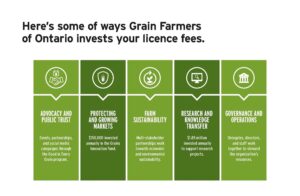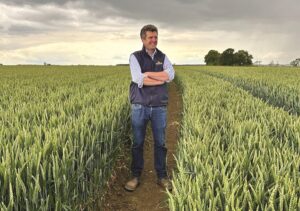Navigating farm succession
CONVERSATIONS WITH BUSINESS EXPERTS

(J.M.) WHAT DO FARMERS NEED TO KNOW ABOUT SUCCESSION PLANNING?
(M.V.) Most people don’t know that, if done well, there’s power in building a farm succession plan. It is more than tax planning and legal documents (although it’s important to get these right); a succession plan allows both generations to build skills, advisor relationships, alignment, confidence, and trust. Succession planning also helps us to develop better communication and collaborative decision-making skills— two key factors that can result in stronger relationships all around.
Farm families need to understand that accepting change is easier if it is co-created and happens incrementally. Today’s succession plans are no longer singular events created by the existing generation; they are a series of smaller questions asked and answered together over an agreed-upon time period.
Farmers also need to know there are resources to help them navigate this process, including a new series of free and inexpensive tools to start building up the knowledge and skill sets needed for succession to be successful. Farmers’ Bridge is a new service that helps farms with the transition between generations, more efficiently and professionally, with a people-centric approach.
Farmers can start with our on-demand video training. Currently, two courses are available on the learning platform at utensil.ca, with plans for more. Transition Foundations is a series of short videos of experts clearly answering common succession questions. Another course is Transition Communication, which provides farm families with practical tools to make decisions together, understand conflict, and create clarity with aligned goals.
Whether it’s conflict mediation, counselling, transition planning, financial planning, coaching, tax or legal advice, Farmers’ Bridge has nationwide, farm experienced experts who can help.
WHAT’S DIFFERENT ABOUT FARM SUCCESSION PLANNING TODAY?
Recent reports show that more farmers are developing succession plans, and many of them have wills. That’s encouraging, but the reality is that the average age of farmers is increasing, and today’s farm situations are more complex — farms are more valuable, have higher income, employ more people, are more specialized, and utilize more technology. Farms today can also have multiple enterprises with generations of family working on them.
Today’s farm retirement statistics are the reason we started Farmers’ Bridge. With 40 per cent of Canadian farmers expected to retire in the next 10 years, and only 12 per cent of farmers with written succession plans completed, this gap will leave our industry very vulnerable.
What matters most today is that, on average, farmers are getting progressively older, and a large cohort is well into retirement age. While farmers are living longer, we need to transition roles and responsibilities and ownership years, even decades, before age limitations or wills kick in.
WHAT MAKES A SUCCESSFUL FARM SUCCESSION?
It starts with better communication. I believe all succession problems are communication problems, and it isn’t easy. The transition process means farmers are moving from communicating as a family to communicating as business partners.
Don’t assume one big succession family meeting will get the job done. Everyone needs to take a consistent, safe, and focused approach to communicating and decision- making. And don’t just jump to tax-saving and legal structure solutions. Establish a way to communicate that works for your farm and family so the planning process goes smoother. In the long run, it will save time, headaches, and money.
DO YOU HAVE ANY TIPS FOR CREATING A FARM SUCCESSION PLAN?
You are all on one team. Align your goals and core values and keep everyone informed along the way.
Timelines are guidelines. Deciding on timelines is much easier than talking about money, so do that before you dive into seeking succession solutions. The next generation needs lots of time to pay off mortgages and build the business, so don’t let fear cut that short.
You are not alone. There are professionals who can help you. A multidisciplinary approach can be more efficient. Also, this is very emotional for all parties, so if you are struggling, talk to someone you can trust and maybe even a counsellor.
Create a bundle of hope. You need to understand that it’s more involved than just a succession of ownership plans. It’s really a series of smaller co-created plans for change, such as strategic business plans, retirement, financial, estate, housing, roles and compensation plans, and, of course, tax and business structure plans. •


























